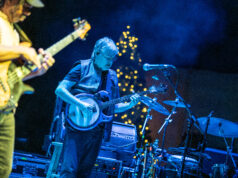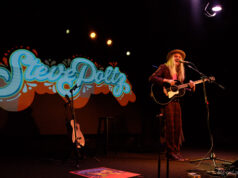Regina Spektor’s music is a reflection of her personality: quirky, humorous and deeply heartfelt. The were many laughs recently when she played a solo performance at Wolf Trap, starting with her second song of the night, “Summer In The City,” which opens with a bit about all the cleavage on display in New York during that season.
How Spektor got to where she is now, in terms of success and acclaim, is a unique American story. She was born to a Jewish family of musicians in Moscow, Russia, in 1980. Her father, a photographer, plays the violin on an amateur basis, and he obtained contraband tapes of major rock acts that Regina listened to as a child. Her mother, who taught music at a Soviet university, now teaches music at an elementary school.
Spektor started playing the piano at the age of seven. In 1989, when she was nine years old, her family moved to the Bronx. At that time, the Soviet Union was in a period of reforms spearheaded by Mikhail Gorbachev, though, as we would find out in a few short years, this was the last gasp of the USSR. These reforms allowed many Russian Jews, who’d faced anti-Semitism in Russia since before the Communist takeover in 1917, to emigrate, mostly to the United States and Israel.
For the Spektors, as it was for many of the immigrants, the trip was not an easy one. Before being admitted to the United States, they lived, for a time, in Austria, then Italy. They had to leave almost everything behind, including Regina’s beloved piano. Without a piano of her own, Regina practiced on one in the basement of her family’s synagogue. Her family took their Judaism seriously, sending her to a yeshiva — a school that emphasizes Jewish religious instruction in addition to secular subjects — for her first two years of high school.
Initially, she was only interested in classical music, studying with Sonia Varga, who taught classical piano at the Manhattan Institute of Music. Over time, she became increasingly interested in hip-hop, punk, and rock as well. On a trip to Israel on a teenager, she realized she had a real talent for songwriting when she entertained the other members of her touring group with songs she made up while they were hiking.
As she got serious about her music, Regina fell in with the anti-folk crowd centered around the East Village. Through this community, she met her future husband Jack Dishel, who played with The Moldy Peaches. She also played local colleges, like Sarah Lawrence, and sold her early self-made CDs, 11:11 and Songs, at her shows. In 2003-2004, she opened on tour for the Strokes; in 2004, she signed a contract with Sire records, who distributed her previously self-released third record, Soviet Kitsch.
Flash forward to Wolf Trap on August 3. Regina began her set with “Ain’t No Cover.” She described the next number, “Summer In The City,” as “my summer bummer song.”
Stream “Summer In The City” by Regina Spektor on YouTube:
“Folding Chair,” she explained, “is my summer less of a bummer song.” Last year, Spektor released the LP, Home, before and after. Some of the songs on the album, like “Becoming All Alone,” the first track, are actually very old. She’s been playing many of these older songs live for a long time, but she hadn’t recorded them. She followed with another song from the album, “Loveology.” Later in the set, she played two more songs from the album, “What Might’ve Been” and “Spacetime Faerytale.”
The set continued with “Eet,” “Baby Jesus,” “How,” and “What Might Have Been.” On “Better,” she got the audience to clap along to the beat. The next song, delivered a capella, was a hybrid of one of her own tunes with a Bille Holiday number. She remarked, “You’re gonna know what part is me.” After “Poor Little Rich Boy,” she told the audience, “I’ve been having nerves today. This place is just too pretty.”
Introducing “Ballad of a Politician,” she made a cutting remark about how “the best and nicest among us go into politics.” The set continued with “Some Days” and “Apres Moi.” Regina thanked her ASL interpreters and said that the next song, “Two Birds,” was “brought back into my life by ASL, by people signing it.” After “Spacetime Faerytale,” she asked, “Are you okay with a few more songs?” The audience responded enthusiastically, and she continued with “Us,” “On The Radio,” and “One More Time With Feeling,” finishing with “Fidelity.” For her encore, she played “Samson.”
Watch the official music video for “Samson” by Regina Spektor on YouTube:
Boston’s Aimee Mann opened the show with a great 45-minute set. Beginning her career with the New Wave band ‘Til Tuesday, Aimee went solo in the early ’90s, releasing a string of critically acclaimed albums. Director Paul Thomas Anderson, a fan of her work, enlisted her to record the soundtrack for his film Magnolia. It brought her further recognition, but, as Aimee has discussed, she opted for a career path that focused on making art rather than being a star.
As something of a cult figure, her influence has far outstripped her commercial success. Her smart, literate, sensitive songwriting has inspired a generation of female artists who followed her: Lilly Hiatt, Jenny Lewis, Kathleen Edwards, Liz Phair, Fiona Apple, and, of course, Regina Spektor.
Last year, Aimee released her latest LP, Queens of the Summer Hotel. The songs written for a musical stage adaptation of Girl, Interrupted, a memoir about a woman’s time spent in a mental institution. Mann quipped that, having made (and a won a Best Folk Album Grammy for) an album called Mental Illness in 2017, she was a natural choice to write these songs. “Suicide Is Murder” was the first tune she composed for the project.
Watch the official music video for “Suicide Is Murder” by Aimee Mann on YouTube:
Many of the songs on Mental Illness were cowritten with singer-songwriter Jonathan Coulton, who’s been touring with Aimee. For two of those songs — “Patient Zero” and “Rollercoasters” — he joined her onstage. The set began with the seasonally appropriate “Lies of Summer” and included “You Fall,” “You Never Loved Me,” “The Moth. “Burn It Out,” “Little Bombs,” and “I Can’t Help You Anymore.” She also played “Save Me,” one of the standout numbers from the Magnolia soundtrack, finishing with “King of the Jailhouse.”
I’ve long admired both Mann and Spektor, but this was my first seeing either of them live, and it absolutely lived up to any expectations I had. If you have a chance to see either of them, don’t sleep on it.






